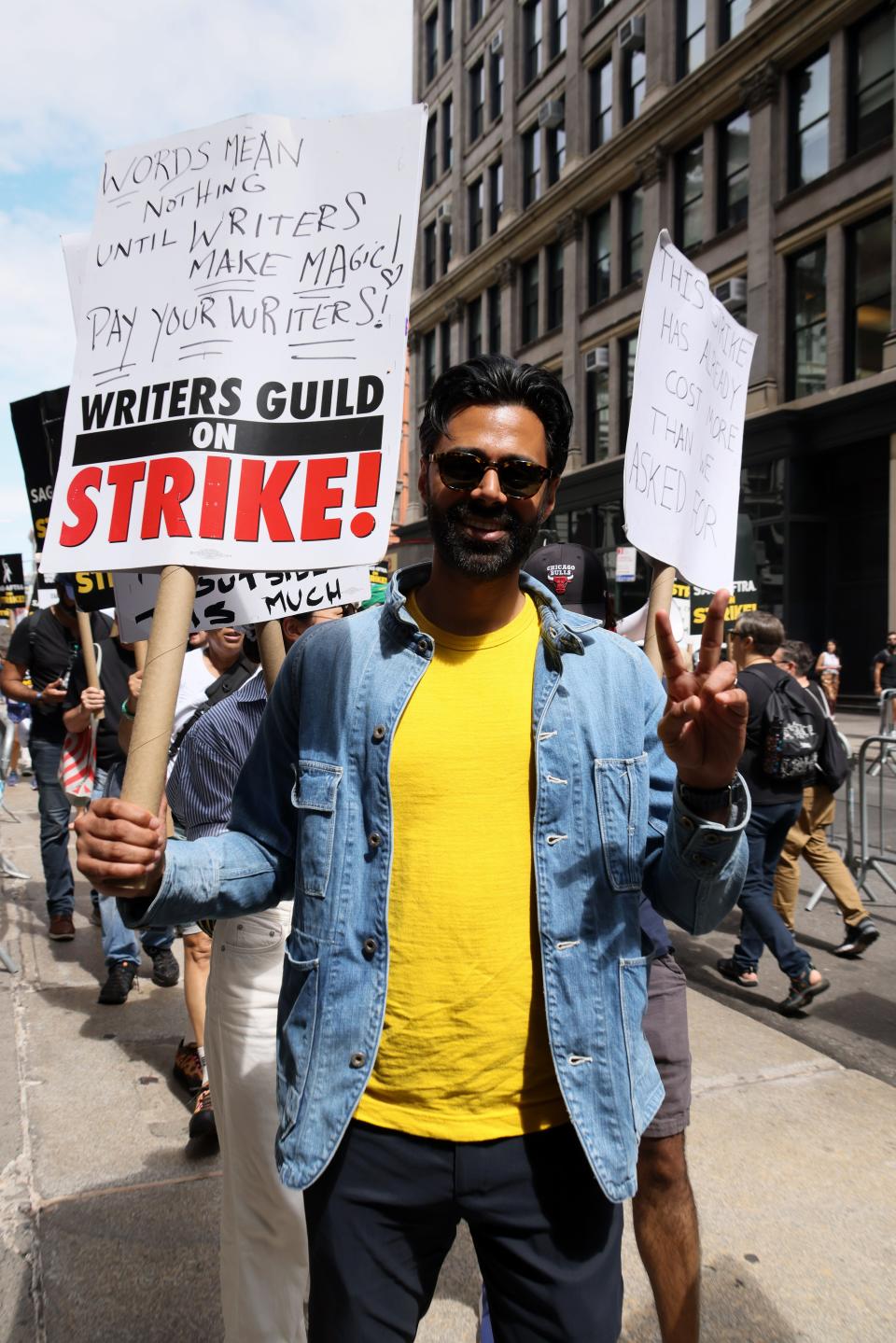Hasan Minhaj responds to New Yorker profile, accusation of 'faking racism'
- Oops!Something went wrong.Please try again later.
Hasan Minhaj, facing controversy from a September profile in The New Yorker in which stories he told in his standup routine were questioned, is responding ‒ in great detail.
The comedian, 38, released a 20-minute video Thursday reacting to what he called a "misleading" article, a "deep-dive in my own scandal" in what he calls "the most Hasan Minhaj thing ever."
In the video, Minhaj provides context to the stories told in his standup that The New Yorker story questioned, including the time he said he was rejected for prom because of racism, an alleged anthrax scare at his home and run-ins with law enforcement surveilling the Muslim community in his hometown of Davis, California.
"With everything that's happening in the world, I'm aware even talking about this now feels so trivial," Minhaj says in the video. "But being accused of 'faking racism' is not trivial. It's very serious, and it demands an explanation.
"I want to answer the biggest question that's probably on your mind: Is Hasan Minhaj secretly a psycho? Underneath all that pomp, is Hasan Minhaj just a con artist who uses fake racism and Islamophobia to advance his career? Because after reading that article, I would also think that."
The New Yorker story alleges that Minhaj embellishes stories and is selective in the information he presents, creating routines based on "emotional truth" to make points about racism in America.

Hasan Minhaj says he made 'artistic choices' in standup, New Yorker responds
Minhaj explains that he took "a beat" to respond to the article, to process what's happening in the Middle East with the Israeli-Hamas attacks and all of the criticism he faced after the article's publication.
"I just want to say to anyone who felt betrayed or hurt by my standup, I am sorry," the "Homecoming King" comedian says in the video. "I made artistic choices to express myself and drive home larger issues affecting me and my community, and I feel horrible that I let people down.
"And the reason I feel horrible is because I'm not a psycho. But this New Yorker article definitely made me look like one. It was so needlessly misleading," he continues. "Not just about my standup, but also about me as a person. Truth is, racism, FBI surveillance and the threats to my family happened. And I said this on the record."
The fallout extended beyond fan commentary online: Minhaj was poised to take over as host of Comedy Central's "The Daily Show" before the article's publication. The show has since resumed guest hosts in search of a permanent anchor.
In response to Minhaj's video, The New Yorker said in a statement to USA TODAY Thursday: "Hasan Minhaj confirms in this video that he selectively presents information and embellishes to make a point: exactly what we reported. Our piece, which includes Minhaj's perspective at length, was carefully reported and fact-checked.
"It is based on interviews with more than 20 people, including former 'Patriot Act' and 'Daily Show' staffers; members of Minhaj's security team; and people who have been the subject of his standup work, including the former F.B.I. informant 'Brother Eric' and the woman at the center of his prom-rejection story. We stand by our story."
USA TODAY has reached out to Minhaj's rep for comment.
Hasan Minhaj explains racism stories in Netflix specials
In his Netflix special "Homecoming King," Minhaj tells the story of a white girl, whom he gives the fake name "Bethany Reed," that he says he asked to prom, but who rejected him because her family didn't want their daughter in photos with "a brown boy."
"Bethany's mom really did say that – it was just a few days before prom," he says in the video, showing emails and texts with Bethany he claims the New Yorker ignored.
The emails Minhaj shows indirectly reference the prom rejection, with Bethany thanking Minhaj for "protecting" her family and noting her parents have come "a long way."
"I created the doorstep scene to drop the audience into the feeling of that moment, which I told the reporter," he says in the video before playing an audio clip of part of his conversation with the article's writer, Clare Malone, about the scene.
Hasan Minhaj addresses his 'unhinged' 'Celebrity Jeopardy!' appearance: 'Fans hate my guts'
Addressing the other stories from his standup, Minhaj admitted both in the article and the video that he embellished stories about being harassed by law enforcement surveilling the mosque his family attended and taking his daughter to the hospital after she was exposed to what was thought to be anthrax in a letter sent to their home.
"I thought I had two different expectations built into my work: my work as a storytelling comedian and my work as a political comedian, where facts always come first," he says in the video. "That is why the fact-checking on (Minhaj's Netflix comedy talk show) 'Patriot Act' was extremely rigorous. But in my work as a storytelling comedian, I assumed the lines between truth and fiction were allowed to be a bit more blurry. And I totally get why a journalist would be interested in where that line sits.
"The guy in this article is a proper … psycho, but I now hope you feel like the real me is not," Minhaj ends the video. "Again, there is much more important news happening in the world right now that needs your attention. So I appreciate you watching, I take the note, and I hope to see you at the next show."
After controversy, Hasan Minhaj kicks off tour in Milwaukee. We can't discuss his jokes.
This article originally appeared on USA TODAY: Hasan Minhaj address New Yorker story controversy

